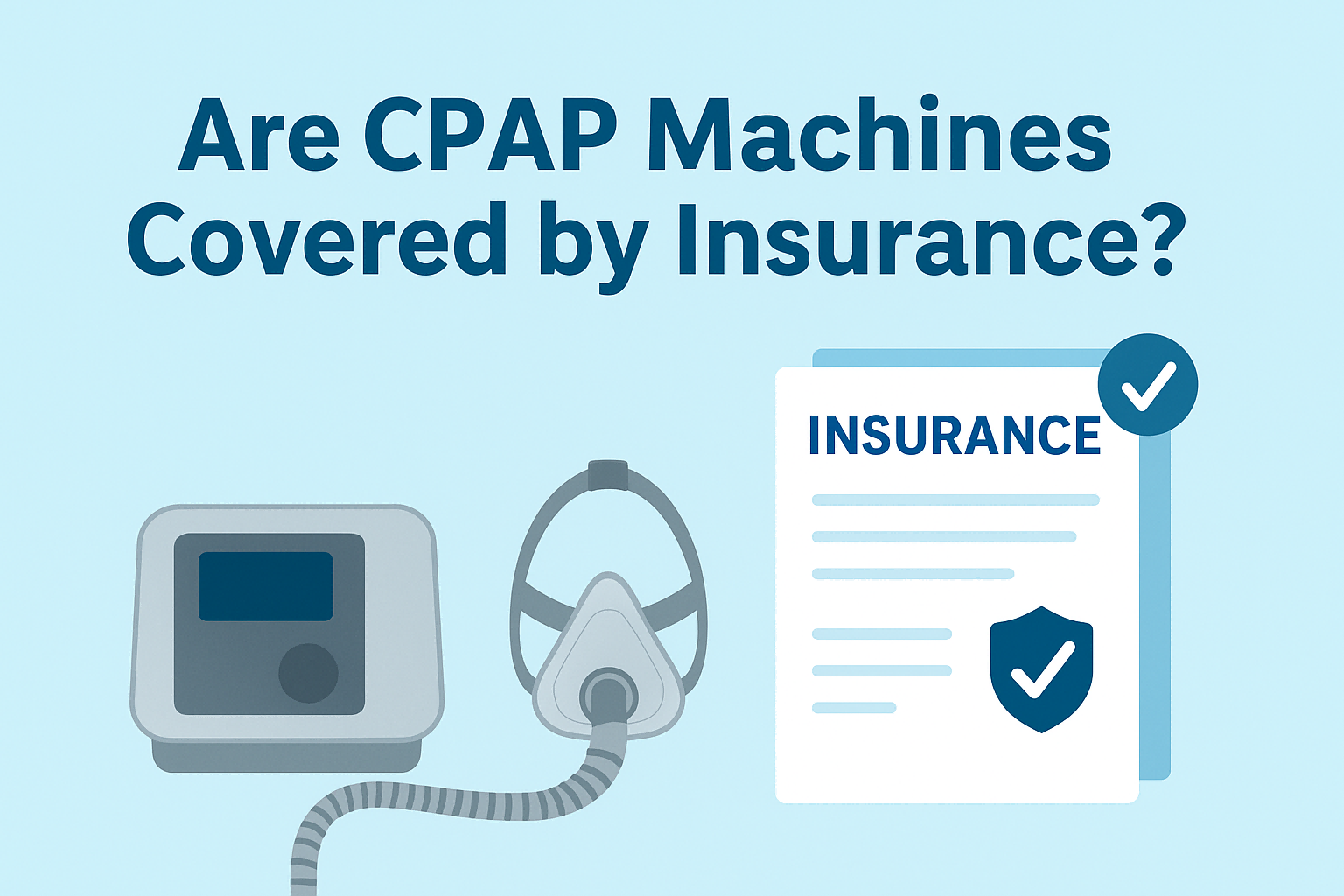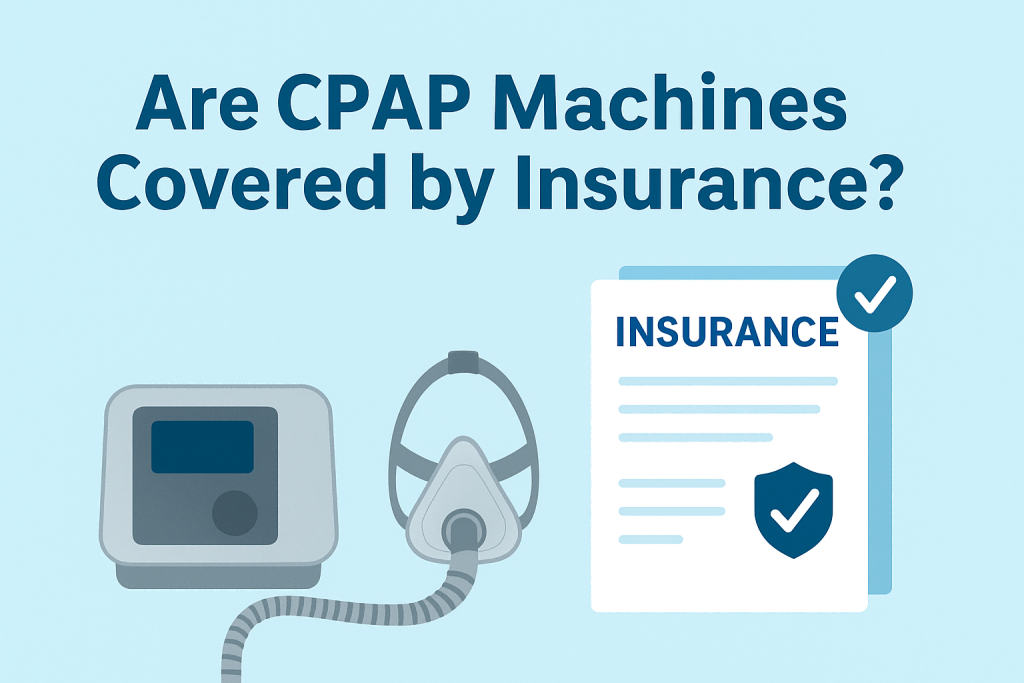Are CPAP Machines Covered by Insurance? A Complete Guide for Patients (2025)


Introduction: Why Insurance Coverage Matters for CPAP Users
If you’ve been diagnosed with sleep apnea, chances are your doctor has recommended a CPAP machine (Continuous Positive Airway Pressure). While these devices are highly effective in treating sleep apnea, they don’t come cheap — with prices ranging from $500 to over $3,000 depending on the model and accessories.
This raises a crucial question: Are CPAP machines covered by insurance? The answer is usually yes, but coverage depends on your insurance provider, the type of plan you have, and whether you meet certain medical requirements. This guide breaks down everything you need to know about insurance coverage for CPAP therapy in 2025.
What is a CPAP Machine and Why is it Prescribed?
How CPAP Therapy Works for Sleep Apnea
A CPAP machine delivers constant air pressure through a mask while you sleep. This prevents the airway from collapsing, reducing snoring and dangerous breathing pauses.
Types of CPAP Machines (Standard, Auto-CPAP, BiPAP)
- Standard CPAP – Provides continuous air pressure at one setting.
- Auto-CPAP (APAP) – Adjusts pressure levels automatically.
- BiPAP (Bilevel Positive Airway Pressure) – Provides different pressures for inhaling and exhaling, often used for severe cases.
Doctors prescribe these devices after a sleep study confirms sleep apnea, making them medically necessary.
Do Health Insurance Plans Cover CPAP Machines?
Medicare Coverage for CPAP Devices
Medicare typically covers CPAP therapy if:
- You have a documented sleep study diagnosis.
- You meet usage compliance requirements (at least 4 hours per night on 70% of nights during a 30-day trial).
Medicare Part B generally covers 80% of CPAP machine costs after the deductible. Patients are responsible for the remaining 20%.
Medicaid Coverage and State Variations
Medicaid coverage varies by state. Some states cover both the machine and replacement supplies, while others have stricter requirements or limit the frequency of replacements.
Private Health Insurance Coverage Policies
Most private insurers (e.g., Blue Cross, Aetna, Cigna) cover CPAP devices but require:
- A prescription from a certified doctor.
- Proof that the device is medically necessary.
- Documentation from a sleep study.
Insurance Requirements Before Coverage Approval
Sleep Study (Polysomnography) Requirements
Most insurance plans require a sleep study to confirm sleep apnea before approving coverage.
Prescription From a Certified Sleep Specialist
A prescription is mandatory for insurance claims and for purchasing a CPAP device legally.
Proof of Medical Necessity
Doctors must document why the patient needs a CPAP machine, usually supported by AHI (Apnea-Hypopnea Index) results.
What Costs Are Typically Covered by Insurance?
Machine Costs
Insurance often covers a portion of the CPAP machine’s price, but the way it’s billed can vary. Some insurers treat it as a rental first—you pay a monthly fee until you’ve used the device for a set period (often 12–13 months). Once you’ve met compliance requirements, ownership is transferred to you.
Mask, Tubing, and Replacement Parts
CPAP therapy isn’t just about the machine itself. The mask, tubing, filters, and humidifier chamber all need replacement at regular intervals. Most insurance plans cover replacements but follow strict schedules. For example:
- Mask cushion: every 1–3 months
- Tubing: every 3 months
- Full mask: every 6–12 months
- Filters: monthly or quarterly
Follow-up Visits and Monitoring
Many insurers also cover follow-up doctor visits, compliance checks, and in some cases, remote monitoring through CPAP data cards or apps.
Common Out-of-Pocket Costs for CPAP Users
Deductibles and Copayments
Even with coverage, patients must pay deductibles and copayments. For example, if your deductible is $1,500 and you haven’t met it yet, you’ll need to pay the full cost until that amount is reached.
Rental vs. Purchase Options
Some insurance companies only offer CPAP machines as rentals first. While this reduces upfront costs, it may end up costing more over time compared to an outright purchase.
Factors That May Affect Insurance Approval
Compliance with CPAP Usage
Most insurers require proof that you’re using your CPAP regularly. Data from the machine must show at least 4 hours of use per night on 70% of nights during the trial period. Failure to meet compliance may result in denial of continued coverage.
Pre-authorization Requirements
Some providers need pre-authorization before you can get a CPAP machine. This usually involves paperwork from your doctor, including sleep study results.
Network vs. Out-of-Network Providers
If you buy your CPAP machine from an out-of-network supplier, insurance might cover less—or nothing at all. Always check whether your provider is in-network.
Alternatives if Insurance Denies Coverage
Buying a CPAP Machine Out-of-Pocket
If insurance denies coverage, you can purchase directly through medical equipment suppliers or online retailers. Prices vary but can be lower if you skip insurance billing.
Manufacturer Discounts and Assistance Programs
Some CPAP manufacturers offer financial assistance programs or discounts for patients without coverage.
Using HSA or FSA Accounts
A Health Savings Account (HSA) or Flexible Spending Account (FSA) can be used to pay for CPAP machines and supplies with pre-tax dollars, reducing your overall cost.
Tips for Maximizing Your Insurance Benefits
Work Closely With Your Doctor
A detailed prescription and strong documentation of medical necessity can speed up the approval process.
Keep Track of Usage Data
Make sure your CPAP machine has data recording features. Providing this data proves compliance and prevents insurance denials.
Understand Your Insurance Policy Terms
Read your policy carefully. Knowing whether your plan covers rentals or purchases, and how often supplies can be replaced, saves surprises later.
How to Appeal a Denial of CPAP Coverage
Steps in the Appeals Process
If coverage is denied, you have the right to file an appeal. The process usually involves:
- Requesting a written explanation of denial.
- Submitting additional documentation from your doctor.
- Providing proof of medical necessity (sleep study results, AHI index).
- Following up persistently.
Documents Needed for Stronger Appeal
- Original sleep study results.
- Doctor’s prescription and letter of medical necessity.
- Compliance data from CPAP usage.
- Any previous treatment attempts or health complications.
Comparing Insurance Coverage Across Different Providers
Blue Cross Blue Shield
Covers CPAP machines after a diagnostic sleep study. Compliance monitoring is mandatory.
UnitedHealthcare
Often requires rental first before purchase. Coverage includes replacements on a set schedule.
Aetna, Cigna, and Others
Policies vary but generally cover machines, masks, and supplies with prior authorization. Always check your specific plan.
International Perspective: Do Other Countries Cover CPAP Machines?
Canada’s Public Healthcare
Coverage depends on the province. Some provinces subsidize CPAP costs, while others require patients to pay out-of-pocket.
UK’s NHS
The National Health Service (NHS) provides CPAP machines free of charge if medically necessary. However, waiting lists can be long.
Australia and European Models
Australia offers partial subsidies. In Europe, countries like Germany and France often provide broader coverage compared to the U.S.
Frequently Asked Questions (FAQs)
1. Do all insurance companies cover CPAP machines?
Most insurers provide some coverage, but requirements vary. Always confirm with your specific provider.
2. Does Medicare cover CPAP machines?
Yes. Medicare Part B covers 80% of costs after deductibles, provided you meet compliance requirements.
3. How often will insurance replace CPAP supplies?
Typically every 3–6 months, depending on the part (mask cushion, tubing, filter, etc.).
4. Can I use an HSA or FSA for CPAP purchases?
Yes. CPAP machines and supplies are eligible medical expenses.
5. What if I don’t meet compliance requirements?
Insurance may stop coverage. However, you can appeal with medical documentation or restart the trial period.
6. Can I buy a CPAP machine online without insurance?
Yes, but you’ll still need a prescription. Buying online may be cheaper if your insurance has high deductibles.
Conclusion: Making CPAP Therapy Affordable
So, are CPAP machines covered by insurance? In most cases, yes—but the level of coverage depends on your provider, policy terms, and whether you meet compliance rules. Medicare, Medicaid, and private insurers typically cover a significant portion of costs, but patients are often responsible for deductibles, copayments, and supply replacements.
If your insurance denies coverage, don’t lose hope—appeals, out-of-pocket purchases, manufacturer assistance programs, and HSA/FSA accounts can make CPAP therapy more affordable.
Sleep apnea is a serious health condition, and access to a CPAP machine can dramatically improve quality of life. By understanding your insurance policy and knowing your options, you can make treatment more accessible and cost-effective.
External Resource:
For more details, you can visit the American Sleep Apnea Association to learn about CPAP therapy, coverage, and patient assistance programs.
















